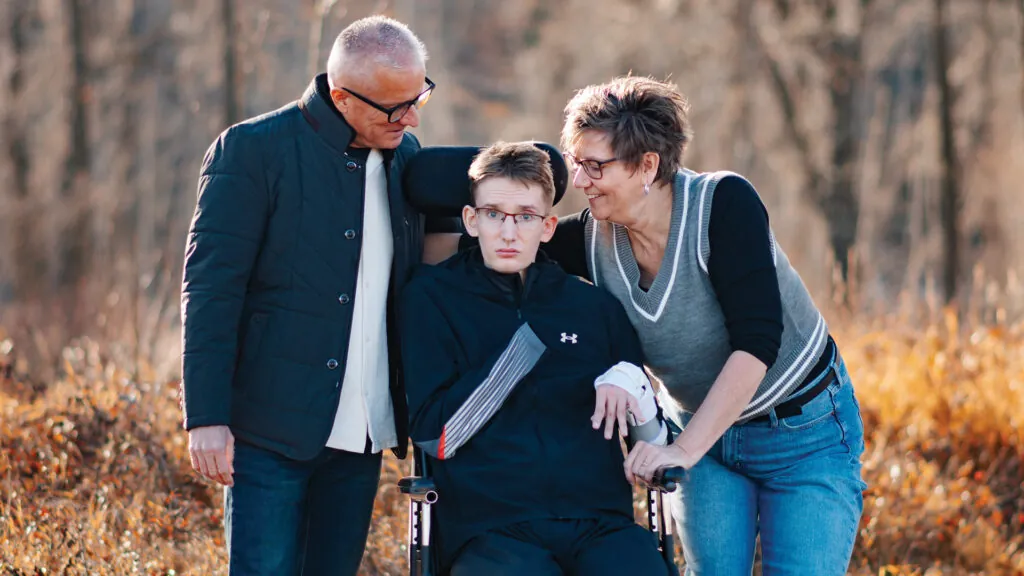Carried
Listen to me, you descendants of Jacob,
all the remnant of the people of Israel,
you whom I have upheld since your birth,
and have carried since you were born.
Even to your old age and gray hairs
I am he, I am he who will sustain you.
I have made you and I will carry you;
I will sustain you and I will rescue you.
(Isaiah 46:3-4)
Surely he has borne our griefs and carried our sorrows; yet we esteemed him stricken, smitten by God, and afflicted.
(Isaiah 53:4a)
*****
Around the year 1000, on a low-lying mountain and near to a trade route, a castle was built. Named Weinsberg Castle, it was situated in what is known today as Baden-Württemberg, Germany. Along the right bank of the Rhine, the area abutted Germany’s largest continuous forest, the Black Forest. It also boasted beautiful valleys and small lakes. Fruit was grown in these valleys and the region had a delightful profusion of vineyards. Weinsberg is, after all, translated as “wine mountain.” The rich, well-drained soil on its sides, plunges roots solidly and deeply downward to seek water. The vines, consequently, produce well-nourished grapes. Truly a wonderful piece of property and a pleasure to visit.
The Castle of Weinsberg does not stand on that mountain any longer, although if you were to pass along a nearby road, you could climb up and visit its ruins. There is a story about the importance of power, wealth and fame touching Weinsberg. It is a good story!
Feudal feuding
In the 1100s, two rival families in Europe were engaged in a feud. The names of these two families, were Welf and Hohenstaufen. Rather like the American Hatfield vs. McCoy disagreement, ongoing power struggles and quarrelling had long taken place in the Weinsberg Castle area. It was not always comfortable or safe to live in the shadow of this beautiful fortress. The Castle of Weinsberg, and its small surrounding town, belonged to the house of Welf, with Welf VI as its head. Conrad III was the head of the Hohenstaufen faction.
In 1138, anger came to a head for the two families due to the fact that Conrad III had just been elected the new Holy Roman Emperor, rather than Welf VI. Bloodshed rather than reconciliation loomed on the horizon. It appeared as if Conrad III, who laid siege to Weinsberg Castle in 1140, might triumph. But the small town and its castle stood firm. The house of Welf were an obstinate lot who refused to buckle, much to Conrad’s irritation.
Seemingly, relief appeared on the horizon for the Welf family. A relative was marching to their aid with an army at his side. However, the tide turned as this army was crushed by Conrad.
The siege of Weinsberg continued and turned out to be a brutal and protracted affair. Conrad III's forces employed a range of tactics to wear down the city's defenses. His army, comprised of heavily armored knights and skilled archers, surrounded the city, totally cutting off the castle’s supply lines, and blocking escape routes. Despite the defenders' valiant efforts, the relentless pressure eventually took its toll, and the once-formidable walls of Weinsberg Castle began to crumble.
The Welfs, whose ancestry could be traced back to Charlemagne (747-814), the first Holy Roman Emperor, were a proud family. By all rights, they should have conceded the battle. But they did not.
Conrad, angered by their obstinacy, vowed that he would make Castle Weinsberg an example to all his enemies. He sent this ultimatum to them:
“Unless you surrender, I am going to demolish the city, burn your houses and put you all to the sword.”
A boon granted
The citizens were, at this point, filled with terror and despair. Supplies were scarce and starvation hung in the air. The men of Weinsberg, knowing that further fighting was futile, sent a reply to the angry besieger. They asked for a pardon. But Conrad was inflexible at this point. He had been offended by the length of the siege, and it had rubbed him the wrong way. Then he received another message from the castle:
“We are not afraid to die and we are ready to continue fighting. We are even prepared to see the castle destroyed and our houses burned; but we are not prepared to see our women die. So, we beg that their lives be spared and that they be allowed to leave the castle.”
Conrad granted this request. And, perhaps suddenly struck by some compassion, he permitted an extra boon for the wives as well. Not only would he allow them to leave the castle unmolested, but he would also give them approval to carry out their most precious possession. But he stipulated that this possession had to be carried by them – carried without the help of carts or animals.
When Conrad’s message was read out loud in the town square, all the men nodded soberly. They agreed to his conditions and were happy their wives would be spared.
The Weinsberg women, including Welf VI’s wife, Uta, had also been listening to the message. Uta, at the time of her marriage to Welf, had been one of the richest heiresses in Germany. A wealthy, respected woman, she left the square solemnly, Conrad’s message ringing in her ears. Then she assembled with all the women of Weinsberg. Together they gravely and rationally conferred with one another, and they came to a decision about what they would carry out – about what their most treasured possession was.
Total agreement
The next morning, the gates of Weinsberg Castle were thrown wide open for the departure of the duchess and the other women, who would take, so it was thought, money and provisions for the journey ahead to safe territory. But Conrad III, and his army, were taken aback at what came through the gates. The first woman to appear was the Duchess Uta, and, on her shoulders, she bore her husband, Welf VI. Behind her came all the other women. Some of them, like Uta, carried their husbands; others carried parents, children, or sickly relatives on their backs.
Disregarding jewelry and personal safety, but counting loyalty and love for their husbands and others as their most precious possessions, the women bore fellow citizens on their shoulders. It was not an easy physical feat and it was one that might have been unacceptable to Conrad. As a matter of fact, Duke Friedrich, Conrad’s brother, commented disapprovingly that such things should not be allowed. The king, however, with a certain amount of admiration, showed favor to the women's cunning, and replied that it would not be fitting to change one’s royal word. He honored his agreement despite the fact that he had not foreseen the result.
The siege ended peacefully and the castle was later renamed Schloss Weibertreu, which means “castle of women’s faith,” symbolizing the bravery and loyalty of those women.
Another man
Although this story warms hearts and illustrates bravery, affection and compassion, there is a story, another story, which is greater and filled with more grace and love for saving family, than even these women were able to give.
This other story involves a man who, although he was of princely dynasty, did not have a particularly regal appearance. He was not popular either. The truth is that he was mocked by most. He was neither respected nor wanted. He did not impress his opponents. As a matter of fact, you could go so far as to say that he was despised and rejected by people. Yet, despite his high disapproval rating (even his few friends forsook him), this man walked freely, alone and of his own accord, towards a battlefield. This battlefield was a vineyard and it was called Gethsemane. Filled with dying branches, it was being besieged by the “god of this world,” by the “prince of the power of the air” – by the most hideous and evil host that ever was on earth. Incredibly, the man’s goal was to fight a battle by himself against this horrendous horde. Why? So that he could carry his family to safety away from this murderous throng.
In the darkness of the blackest of nights, the besieging army, carrying torches, spears and staves, met the solitary man.
And the man, walking boldly towards them, asked this opposing army a question. Twice he asked the same question: “Whom do you seek?”
When he was told that he was the one whom they wanted, the man answered by giving these amazing words of creation, redemption, and comfort: “I am he. So, if you seek me, let these men go.”
The voice of that man, the voice of Truth, echoes and resounds: “Let these men, let my people, go.”
Ecce Homo.
What the Man said then, is true today and will be true tomorrow. Jesus knows His people. They are part of His family. They are the branches in His vineyard, and He is the vine. They are a people freed, a people let go and they are His own. And He knows them even though they might be old and have gray hairs. His care extends beyond time and He carries them with love and purpose, even through extremely difficult and besieged times. He bears them in their griefs and He carries them in their sorrows, carries them to a heavenly mansion which He has prepared for them....































